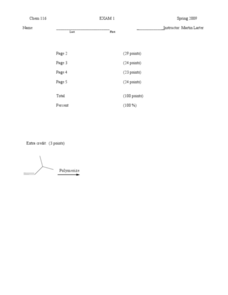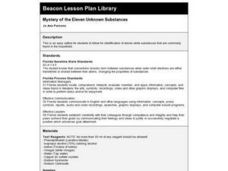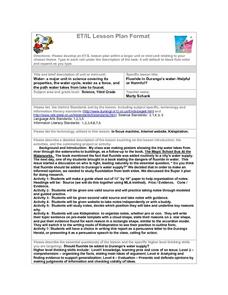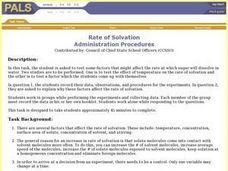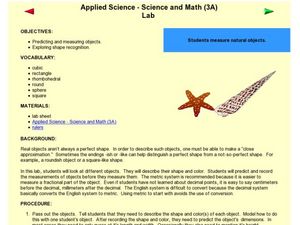Curated OER
Chemistry 116 Exam 1, Spring 2009
This five-page exam was designed for a biochemistry and organic chemistry course. It covers the molecular geometry and properties of organic comounds. Test takers identify compounds, functional groups, and isomers. They draw Lewis...
EngageNY
Relationships Between Quantities and Reasoning with Equations and Their Graphs
Graphing all kinds of situations in one and two variables is the focus of this detailed unit of daily lessons, teaching notes, and assessments. Learners start with piece-wise functions and work their way through setting up and solving...
Curated OER
Rocks and Minerals
Students investigate the properties and uses of rocks and minerals. They build towers using only one material from a pile of stones, tiles, wood, etc. provided by the teacher. Students test the hardness of rocks by scratching them with...
Curated OER
Blubber Mittens:Adaptation to Cold Climates
Students get a first hand look at the benefit of a "blubber layer" in cold climates through a simulation using vegetable shortening and icy water. Through this simulation, students examine how adaptations help organisms survive.
Curated OER
A Healthy Diet is a Balancing Act
It's important to teach kids how to have a balanced diet. They are provided with six different meals, they fill in the blanks to complete each one to make it balanced. The answers could be anything and the meals offered don't seem very...
Inside Mathematics
Swimming Pool
Swimming is more fun with quantities. The short assessment task encompasses finding the volume of a trapezoidal prism using an understanding of quantities. Individuals make a connection to the rate of which the pool is filled with a...
Virginia Department of Education
Acids and Bases
What did one titration say to the other titration? We should meet at the end point! Young chemists perform four experiments: dilute solution, neutralization, titration, and figuring pH/pOH.
Messenger Education
Cooling with Sunshades
Messenger's sun shade measures 8 ft x 6 ft and will have temperatures reaching 700 degree Fahrenheit on the outside while maintaining a cool 70 degrees underneath. In the third activity of four, groups discuss the basic properties of...
Beyond Benign
Catalysts and Oxygen
Here is an engaging and hands-on lesson plan that allows high school chemists to demonstrate the effects of a catalyst on various chemicals. They garner knowledge of how reactants and products differ from one another, while...
Curated OER
Sensational Seaweed
Students compare kelp and land plants. In this sea plant lesson, students look at the role of algae in aquatic environments. They research the properties of kelp and explore seaweed.
Balanced Assessment
Bumpy-Ness
Develop a new measure of the properties of an object. Scholars develop a definition and formula to measure the bumpy-ness of an object. They utilize their formulas to find the property for several spherical objects.
University of Wisconsin
Sizing a Rain Garden
Most appropriate if you are applying the entire unit to build a rain garden at your school, this installment involves calculating the area that will drain into it. Your garden planners will need data from previous lessons, so this one...
Cornell University
Spectral Analysis with DVDs and CDs
Build a spectrometer to analyze properties of light. Scholars examine the spectrum from CDs and DVDs from two different light sources. Using the spectrum, they work to identify different elements.
Curated OER
Mystery of the Eleven Unknown Substances
Fourth graders identify eleven white substances that are commonly found in the household. They, in pairs, perform experiments on a variety of substances, and must identify them based on the reactions they observe.
Curated OER
Fluoride in Durango's Water-Helpful or Harmful?
Third graders complete several activities in their quest to find out about the addition of fluoride to city water. First, they create a guide sheet to help organize notes. The next two steps involve taking notes through guided practice....
Curated OER
Combination of Atoms
In this atoms worksheet, students review protons, neutrons, electrons, molecules, compounds, and ions. This worksheet has 10 fill in the blank and 3 problems to solve.
Curated OER
Fun in the Sun
Students freeze colored water. In this art lesson, students take the blocks of ice out of the freezer, put the blocks into a small pool and watch the ice melt.
Curated OER
Introduce Solids
Students identify and interpret a variety of solid materials - cloth, wood, metal, plastic, paper, and rubber. After a period of free exploration, they then describe the properties of the objects and develop vocabulary in order to...
Curated OER
Permafrost: Permanently Frozen Ground
Students explore permafrost. In this 3 states of matter lesson, students identify characteristics of solids and liquids. Students observe water and soil melting and freezing at various temperatures. Students make...
Curated OER
Rock Cycle SIOP Unit
Young scholars collect rocks, identify them, classify them, investigate their properties, and more. In this rocks lesson plan, students also experiment with soil and erosion and weather.
Curated OER
What Can We Do To Change These Materials
First graders perform experiments to investigate property changes that occur in materials or matter. In the science lab, they use heat to explore changes in rice, sand, gelatin, baking soda and more. Learners observe and record the...
Curated OER
Rate of Solvation
Students test factors that may affect the rate at which sugar dissolve in water. They conduct two studies: One is to test the effect of temperature on the rate of solvation and the other is to test a factor which Students come up with...
Curated OER
Measuring Natural Objects
Students predict the measurement of objects. In this measurement lesson, students estimate the measurements of objects in a lab. Students measure irregular objects and generate scientific observations.
Curated OER
Properties of Matter
Students describe four states of matter and their characteristics, explain thermal expansion of matter, interpret state changes in terms of kinetic theory of matter, explain relationship between temperature and volume of a gas, state...


